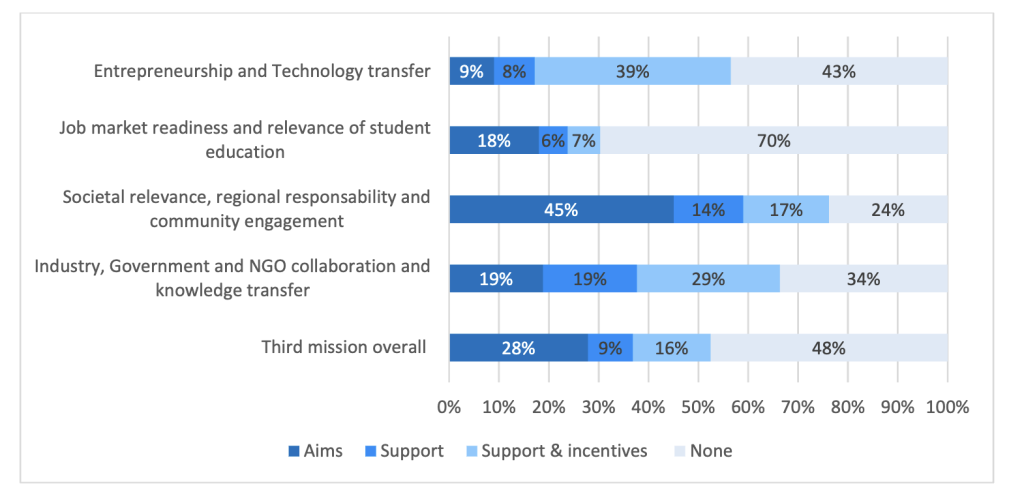Research Ethics and Integrity is a cornerstone of the responsible conduct of research and innovation. It is a matter of the application of ethical principles to all stages and aspects of research and the attitude and habit of the researchers to conduct their research according to appropriate ethical, legal, and professional frameworks, obligations, and standards.
Our study relies on data collected as a document study of 122 European HEIs, of which more than 9 out of 10 Higher Education Institutions (HEIs) included Research Ethics and Integrity in their main strategic documents and policies. The documents were analysed with respect to the above understanding of what Research Ethics and Integrity includes, while also remaining open to new elements.
The graph below shows how the HEIs work with Research Ethics and Integrity; whether they have an approach based on establishing aims, on supporting work on Research Ethics and Integrity, or if their approach is a combination of supporting work on Research Ethics and Integrity while also having incentives to work with Research Ethics and Integrity.
 The figure shows that “Research Ethics” feature most prominently in the HEIs’ documents, with 83% of them mentioning it in their strategic documents. “Research Integrity” is also featured in the strategic documents of 62% of the HEIs. “General REI” should be read as instances where it was impossible to untangle whether it was an ethics or integrity policy. 57% of HEIs is categorized in this category, which shows that Research Ethics and Research Integrity of often treated as a single entity. “GDPR and data management” is not always included in definitions of Research Ethics and Integrity, but our data shows 24% of the sample treated it as part of Research Ethics and Integrity umbrella.
Research Ethics and Integrity is a policy area characterised by the strong presence of dedicated units the HEIs and rules and regulations guiding the conduct of researchers. A typical example would be the requirement of approval for new research at a research ethical committee. Some HEIs went into detail and or had multiple kinds of ethics committees, while others utilised general statements. The document study was conducted on publicly available documents, and it is a possibility that the institutions have more thorough internal guidelines and regulations.
The figure shows that “Research Ethics” feature most prominently in the HEIs’ documents, with 83% of them mentioning it in their strategic documents. “Research Integrity” is also featured in the strategic documents of 62% of the HEIs. “General REI” should be read as instances where it was impossible to untangle whether it was an ethics or integrity policy. 57% of HEIs is categorized in this category, which shows that Research Ethics and Research Integrity of often treated as a single entity. “GDPR and data management” is not always included in definitions of Research Ethics and Integrity, but our data shows 24% of the sample treated it as part of Research Ethics and Integrity umbrella.
Research Ethics and Integrity is a policy area characterised by the strong presence of dedicated units the HEIs and rules and regulations guiding the conduct of researchers. A typical example would be the requirement of approval for new research at a research ethical committee. Some HEIs went into detail and or had multiple kinds of ethics committees, while others utilised general statements. The document study was conducted on publicly available documents, and it is a possibility that the institutions have more thorough internal guidelines and regulations.
 The figure shows that “Research Ethics” feature most prominently in the HEIs’ documents, with 83% of them mentioning it in their strategic documents. “Research Integrity” is also featured in the strategic documents of 62% of the HEIs. “General REI” should be read as instances where it was impossible to untangle whether it was an ethics or integrity policy. 57% of HEIs is categorized in this category, which shows that Research Ethics and Research Integrity of often treated as a single entity. “GDPR and data management” is not always included in definitions of Research Ethics and Integrity, but our data shows 24% of the sample treated it as part of Research Ethics and Integrity umbrella.
Research Ethics and Integrity is a policy area characterised by the strong presence of dedicated units the HEIs and rules and regulations guiding the conduct of researchers. A typical example would be the requirement of approval for new research at a research ethical committee. Some HEIs went into detail and or had multiple kinds of ethics committees, while others utilised general statements. The document study was conducted on publicly available documents, and it is a possibility that the institutions have more thorough internal guidelines and regulations.
The figure shows that “Research Ethics” feature most prominently in the HEIs’ documents, with 83% of them mentioning it in their strategic documents. “Research Integrity” is also featured in the strategic documents of 62% of the HEIs. “General REI” should be read as instances where it was impossible to untangle whether it was an ethics or integrity policy. 57% of HEIs is categorized in this category, which shows that Research Ethics and Research Integrity of often treated as a single entity. “GDPR and data management” is not always included in definitions of Research Ethics and Integrity, but our data shows 24% of the sample treated it as part of Research Ethics and Integrity umbrella.
Research Ethics and Integrity is a policy area characterised by the strong presence of dedicated units the HEIs and rules and regulations guiding the conduct of researchers. A typical example would be the requirement of approval for new research at a research ethical committee. Some HEIs went into detail and or had multiple kinds of ethics committees, while others utilised general statements. The document study was conducted on publicly available documents, and it is a possibility that the institutions have more thorough internal guidelines and regulations.